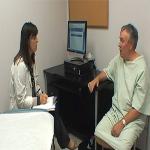2012-2-21

Photo: VOA
Ted Bell, a medical actor, talks with a health care professional.
This is the VOA Special English Health Report.
Some people act sick to get out of work. Others act sick to get work. For medical actors like Ted Bell, the stage is an examination room with a future doctor, nurse or other health care professional.
TED BELL: "I start getting a cramping type pain right here."
EMILY TYRRELL: "And how long do they last for when they occur?"
Mr. Bell is playing a fifty-five-year-old patient with stomach pains that began three months ago.
TED BELL: "I'm a teacher. And several times its happened at school."
Ted Bell is just playing a teacher. But in a way he really does teach. He helps students like Emily Tyrrell at the University of Maryland School of Nursing learn to work with patients.
In real life, Mr. Bell is a retired civil engineer. He now works as what is known as a "standardized patient." He stays busy working at local medical schools.
TED BELL: "And it has developed into a great part time, or retirement job actually, for me, and I go to all six schools in this region, Baltimore-Washington area."
About seven hundred standardized patients work in the area. Pay starts at seventeen dollars an hour. It can go as high as thirty-five dollars an hour depending on the project.
Becoming a standardized patient does not require medical knowledge. The schools provide the training. Nor does it require acting experience. In fact, standardized patient Tom Wyatt is a professional actor -- yet he does not even think of his work with the students as acting.
Tom Wyatt: "I use some of the acting skills, but honestly when its going well, I'm not really acting, I am reacting. I'm listening to them and reacting naturally and honestly to what they're saying to me and what they're giving me."
Standardized patients spend hours training for each of their "performances." They have to remember the medical history of the person they are playing and be able to answer questions as if they were really sick. Tom Wyatt says remembering all the patients he has to play and their conditions can be difficult.
Tom Wyatt: "Especially when I do, you know, sometimes nine or ten cases in a week at three different hospitals, so they're all completely different."
After each session the standardized patients talk to the students to discuss their performance -- that is, the performance of the student.
Tom Wyatt: "The things that really stood out for me: your, your manner was extremely professional. And you were in command at all times. You kind of took charge of the room."
Kurt Haspert is studying to become a nurse practitioner and likes working with medical actors.
KURT HASPERT: "It is always good to do the standardized patients cause it kind of keeps you thinking about how your thought process has to go, and how you can narrow down your differential diagnosis while you're asking questions."
The actors enjoy it too. Retired engineer Ted Bell says the students find the experience very helpful, and that makes him feel good.
And that's the Health Report in VOA Special English. For more news about health, and for transcripts, MP3s and now PDFs of our programs for e-readers, go to 21voa.com. And follow us on Facebook,Twitter, YouTube and iTunes at VOA Learning English. I'm Christopher Cruise.